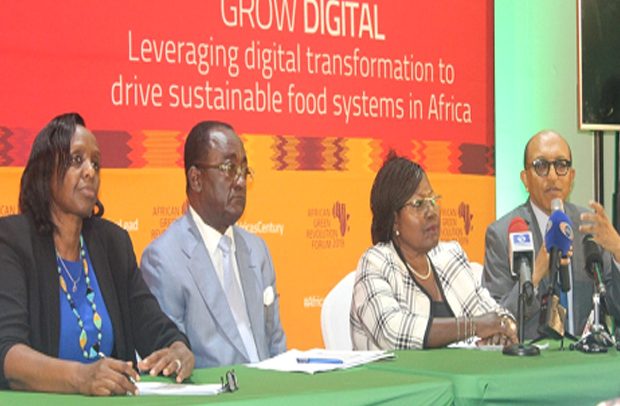Michel Hailu (first right), Dr. Owusu Afriyie Akoto (second left) and other dignitaries at the press conference
The use of digitization tools and solutions for agriculture is fast gaining grounds in sub-Saharan Africa, a new report by the Technical Centre for Agriculture and Rural Cooperation (CTA) has revealed.
The Digitalization of African Agriculture Report (2018-2019), released ahead of the 2019 African Green Revolution Forum (AGRF) in Accra, showed that 33 million smallholder famers and pastoralists have registered with over 390 distinct, active digitization for agriculture (D4Ag) solutions.
The report, which serves as a barometer for the current state of D4Ag in Africa, showed the sector has been growing at about 44 per cent per annum over the last three years in terms of the number of farmers reached.
It, however, showed that D4Ag uptake among women is low, especially considering the disproportionate burden they bear on the farm.
“In sub-Saharan Africa, where 40 to 50 per cent of smallholder farmers are women, only 25 per cent are registered users of D4Ag solutions. Overall, the data suggests that companies are not prioritizing gender as part of their product design, marketing and user engagement efforts,” it stated.
The findings of the report were based on the triangulation of an extensive set of primary and secondary sources.
The CTA President, Michel Hailu, who spoke at the launch of the report, said 26 per cent of the survey participants were breaking even.
“While robust baseline data are not available for comparison, we believe that these results are significantly higher than even a few years ago,” he indicated.
He, however, noted that despite the growth, progress towards D4Ag has been somewhat slow to serve the smallholders who produce 80 per cent of Africa’s agriculture output.
“Nevertheless, the opportunity is there. Agriculture is expected to be trillion-dollar efficiency, sustainable increase in productivity, yield and income,” Mr. Hailu stated.
Dr. Abebe Haile Gabriel, Assistant Director & Regional Representative for Africa, FAO, in his statement, highlighted the need for what he called the “usability of the technology”.
He said although the technology may be available, if it is not utilised because of challenges like poor connectivity, it becomes redundant.
“We should be talking about connectivity problem in Africa and how we can resolve it. We should also look at the affordability as it determines whether a user can adopt a particular technology,” he added.
The Minister for Food & Agriculture, Dr. Owusu Afriyei Akoto, said Ghana has created an environment that is well suited for rapid D4Ag scale-up.
By Jamila Akweley Okertchiri


